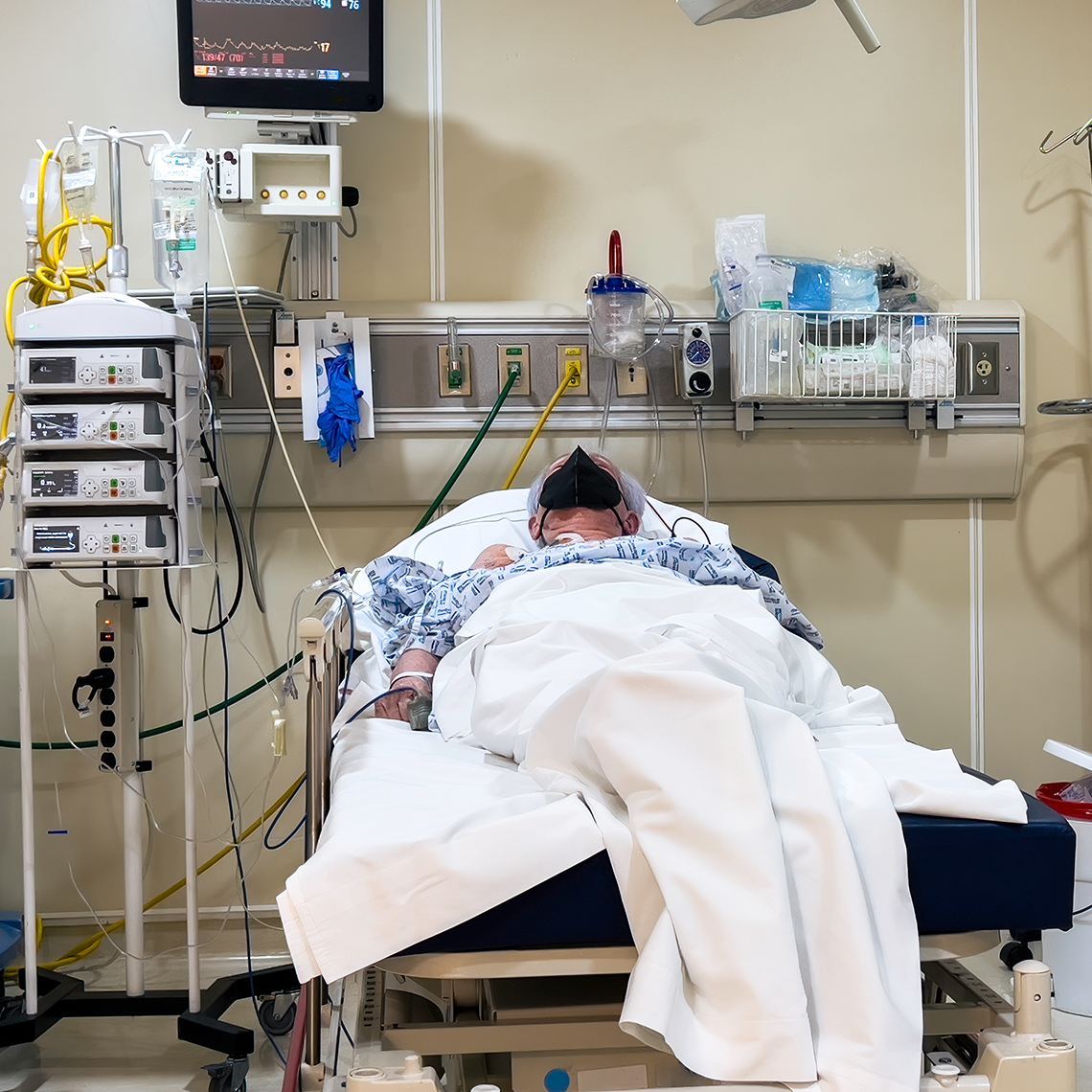Case Study
Multiple Amputations Follow Prolonged ED Stay

Description
A 34-year-old male suffered complications of untreated pyelonephritis, including sepsis and multiple amputations, after spending 17 hours in the Emergency Department (ED).
Key Lessons
- Boarding of critically ill patients is associated with increased mortality
- Abdominal pain coupled with an elevated white blood cell count and fever elevates consideration of urgent testing/imaging
- Weekend and off shift resources, e.g., a radiologist to read a CT scan, cannot be underappreciated
- Trainees require vigilant supervision
- Direct communication between ordering providers and consultants facilitates the development of a collaborative plan to ensure that the patient receives optimal care
Clinical Sequence
A 34-year-old male presented to the ED on a Sunday at 2:30 a.m. with complaints of abdominal pain, vomiting, diarrhea, and fever for several days. His temperature was 100.4°, heart rate 98, and blood pressure 111/70. His labs included a white blood cell count of 20.4 and a urinalysis positive for blood. He was ordered for IV metronidazole, ciprofloxacin, and ceftriaxone. The Emergency Medicine (EM) resident ordered an abdominal CT scan but did not specify that it was urgent. The results of the scan (performed at 10:00 a.m.) were delayed by an hour due to Radiology not being immediately available on Sundays. Those results revealed a right hydroureteronephrosis due to ureteropelvic junction stone and pyelonephritis.
A Urology resident was consulted, examined the patient, but did not appreciate the severity of the situation or the need for nephrostomy drainage for this infection. An intravenous hydration was ordered to flush out the stone. The Urology resident spoke by phone with the Urology attending, who approved the plan. Over the course of the rest of the day and into the evening neither the EM attending, nor the Urology resident spoke with the Urology attending. Interventional Radiology (IR) was never notified. The EM attending planned to admit the patient to the ICU, but no beds were available.
At 3:00 p.m., the patient’s blood pressure started gradually decreasing and he developed a temperature of 103°. The resident was unable to successfully achieve central venous catheter access. Vasopressors were initiated through peripheral access and the patient was finally transferred to the ICU on Sunday night at 10:00 p.m., 17 hours after arriving at the ED.
Within the next few hours, the patient suffered respiratory failure, septic shock, disseminated intravascular coagulation (DIC), acute renal failure, and metabolic acidosis. Monday morning, IR was contacted for a nephrostomy tube placement to drain the infection, but determined that the procedure was too risky due to the increased bleeding time. Later that day, Urology placed a right ureteral stent without noted complication. Due to a positive blood culture, Infectious Disease was consulted to adjust the patient’s antibiotics. Over several days, the patient suffered cyanotic fingers bilaterally, absent distal popliteal and ankle pulses, and an intracranial hemorrhage. Ultimately, he required bilateral below-the-knee and hand amputations, and he experienced severe post-operative pain (maintained on high doses narcotics).
Allegation
The patient sued the ED physicians alleging delayed diagnosis and treatment resulting in septic shock, DIC, and amputation of his legs and hands.
Disposition
The case was settled in excess of $7M.
Analysis
- Failure to appreciate the urgency of diagnosing abdominal pain
Abdominal pain is the most common complaint of adults seen in the ED. Time-sensitive disease processes need to be urgently excluded from the list of differential diagnoses. This includes obtaining imaging studies as soon as possible.
- Failure to communicate among providers
The Urology attending confirmed the assessment without seeing the patient; they only spoke with the Urology resident once. Residency training is an educational experience and should be closely supervised by an attending, including participation in patient assessment.
The Urology and EM attendings never had a conversation regarding the patient’s assessment or plan of care. The EM attending left the care to the Urology resident. Lack of communication is a leading contributing factor to many medical errors. Safely ordering a consult involves direct communication between the provider and the consulting attending, with clear reasons for the consult articulated.
- Failure to appreciate and adequately treat hydroureteronephrosis
The Urology resident failed to appreciate and act on the results of the CT scan. Urinary obstruction in the presence of an infection can lead to sepsis. Although antibiotics were ordered, drainage should have occurred within 12 hours, as recommended by the Surviving Sepsis Campaign 2016.
- Failure to provide the necessary care for a critically ill patient in the ED
The ED is designed for rapid assessment and stabilization of patients before transferring them to an inpatient bed; caring for critically ill patients awaiting ICU placement is particularly challenging. Some potential mitigation strategies that are included in Critical Care Patients Boarding in the Emergency Department, a paper from a task force convened by the Academic Medical Center Patient Safety Organization (AMC PSO).
Resources/References
Macaluso CR, McNamara RM. Evaluation and management of acute abdominal pain in the emergency department. International Journal of General Medicine. 2012;5:789-97.
Communicating with Consultants
Nesbitt J et al. Effect of emergency critical care nurses and emergency department boarding time on in-hospital mortality in critically ill patients. The American Journal of Emergency Medicine. 2021;41:120-24.
Chalfin DB et al. Impact of delayed transfer of critically ill patients from the emergency department to the intensive care unit. Critical Care Medicine. 2007;35(6):1477-83.
Kadar RB et al. Impact of telemonitoring of critically ill emergency department patients awaiting intensive care unit transfer. Critical Care Medicine. 2019:47(9):1201.
This is a fictitious case that illustrates commonly encountered issues and is for educational purposes only. Any resemblance to real persons, living or dead, is purely coincidental.
See More MPL Cases
Medication Mix-up Contributes to Patient’s Death


Retaliation Allegation after Mental Health Leave

Incidental Does Not Mean Insignificant

